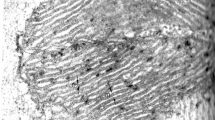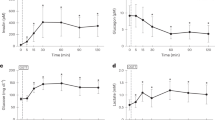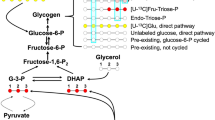Abstract
AFTER partial hepatectomy, the respiratory quotient of liver tissue has been found to decrease to about 0.7, which suggests predominant utilization of lipids1. As early as in the first hours after surgery a decrease of glycogen and an increase of lipids can be observed2. In these circumstances, however, marked enhancement of lipids in liver tissue probably does not represent a manifestation of a degenerative process. The lipids increase mainly in the peripheral cells of the liver lobules, where the processes connected with liver regeneration are most conspicuous3,4 and thus provide a substance which, after partial hepatectomy, is utilized by liver tissue as the main source of energy. Under normal conditions, the energy of the liver tissue in rats fed ad libitum with a mixed diet is obtained by combustion of glycids, which is shown by the respiratory quotient near 1 (ref. 5). We therefore wondered whether the liver tissue after partial hepatectomy, when its respiratory quotient has decreased, is able to utilize glucose for its energetic metabolism if glucose is offered in excess during the acute experiment.
This is a preview of subscription content, access via your institution
Access options
Subscribe to this journal
Receive 51 print issues and online access
$199.00 per year
only $3.90 per issue
Buy this article
- Purchase on Springer Link
- Instant access to full article PDF
Prices may be subject to local taxes which are calculated during checkout
Similar content being viewed by others
References
Šimek, J., and Sedláček, J., Physiol. Bohemoslov. (in the press).
Harkness, R. D., J. Physiol. (London), 117, 267 (1952).
Grisham, J. W., Fed. Proc., 18, 478 (1959).
Recondo, A. M., and Frayssinet, C. H., J. Physiol. (Paris), 55, 242 (1963).
Krebs, H. A., and Johnson, W. A., Tabulae Biologicae, 9, pars 3 100 (1948).
Higgins, G. M., and Anderson, R. M., Arch. Path., 12, 186 (1931).
Warburg, O., and Negelein, E., Biochem. Z., 110, 66 (1920).
Warburg, O., and Negelein, E., Biochem. Z., 113, 257 (1921).
Pardee, A. B., J. Biol. Chem., 179, 1085 (1949).
Krebs, H. A., Biochem. J., 48, 349 (1951).
Bellamy, D., and Bartley, W., Biochem., J., 76, 78 (1960).
Kaminiskii, L. S., Posobie po voennomeditsinskoi statistike (Moskow, 1959).
Clerici, E., and Ciccarone, P., Nature, 201, 1035 (1964).
Derache, R., Viala, M. F., and Gaillard, D., C.R. Acad. Sci., Paris, 258, 2409 (1964).
Šimek, J., Mělka, J., Pospíšil, M., and Neradílková, M., Čs. fysiol., 13, 226 (1964).
Author information
Authors and Affiliations
Rights and permissions
About this article
Cite this article
ŠIMEK, J., SEDLÁČEK, J. Effect of Glucose administered in vivo or in vitro on the Respiratory Quotient of Rat Liver Tissue after Partial Hepatectomy. Nature 207, 761–762 (1965). https://doi.org/10.1038/207761a0
Issue Date:
DOI: https://doi.org/10.1038/207761a0
This article is cited by
-
A method for measuring the molecular ratio of inhalation to exhalation and effect of inspired oxygen levels on oxygen consumption
Scientific Reports (2021)
-
Influence of Protracted Infusion of Glucose and Insulin on the Composition and Regeneration Activity of Liver after Partial Hepatectomy in Rats
Nature (1967)
Comments
By submitting a comment you agree to abide by our Terms and Community Guidelines. If you find something abusive or that does not comply with our terms or guidelines please flag it as inappropriate.



